

Homo Fabulus - Catégorie Best Of. Pourquoi nous sommes le plus gras des singes.

Publié le 21 December 2011 par Stéphane. Si vous êtes obèse, comme un français sur dix (ne vous moquez pas les neuf autres, quatre d’entre vous sont en surpoids), il y a de fortes chances pour que vos rapports sociaux ne soient pas toujours faciles, au moins au premier contact. Comment vous regardent majoritairement les gens : avec un air de reproche de […] Lire la suite L’humain est-il un polygame refoulé ? Publié le 2 July 2012 par Stéphane. Les motivations professionnelles des enfants brillants. Les parents, en général, ont à l’esprit que le jeune construit progressivement ses motivations par son histoire personnelle et qu’il faut donc l’encourager tout en évitant de plus en plus les injonctions explicites ou implicites.
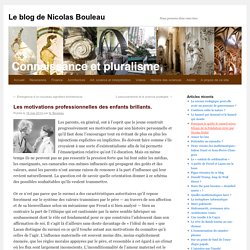
Les motivations professionnelles des enfants brillants. 10 logical fallacies you can probably do without. Older People Are Worse Than Young People at Telling Fact From Opinion. Earnest critiques of the facts and opinions that Ziegler put into the world as if he were a journalist made no sense.
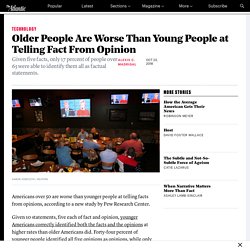
“Maybe it’s better to say that he is part of a peculiar, modern, and very popular type of news industry, one that manages to enjoy the authority and influence of journalism without the stodgy constraints of fairness, objectivity, and responsibility that make trying to tell the truth such a drag for everyone involved,” Wallace concluded. Sound familiar to anyone? The Amish understand a life-changing truth about technology the rest of us don’t. The Amish have negotiated a pact with modernity.
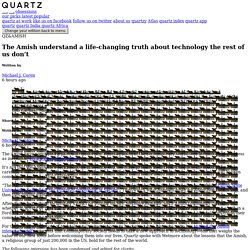
Whereas much of the contemporary world sees technological progress as inevitable, even a moral imperative, the Amish ideal lives in the past, circa 1850. It’s not that the Amish view technology as inherently evil. No rules prohibit them from using new inventions. But they carefully consider how each one will change their culture before embracing it. And the best clue as to what will happen comes from watching their neighbors. Un étrange pressentiment de catastrophe. The Scientific Paper Is Obsolete. Here's What's Next. The scientific paper—the actual form of it—was one of the enabling inventions of modernity.
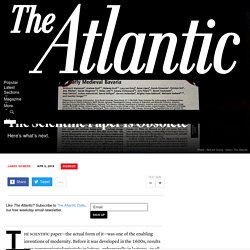
An alarming number of clinical trials are greenlit based on shockingly poor data. Blank on Blank Animated Interviews. L'éloge des écotaxes - Marcel Boiteux - 2004. Automation is more complex than people think. Here’s why. Automation is a topic on which most people have an opinion.
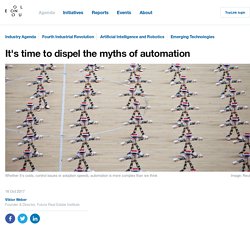
The level of knowledge on the subject varies greatly, as does the amount of fear that people feel towards the technological revolution that is taking place. How I Got My Attention Back. The Culture Factor. How to stop procrastinating: A Quartz at Work guide. The Untold Story of Silk Road, Part 1. 5-Hour Rule: If you’re not spending 5 hours per week learning, you’re being irresponsible.
“In my whole life, I have known no wise people (over a broad subject matter area) who didn’t read all the time — none.
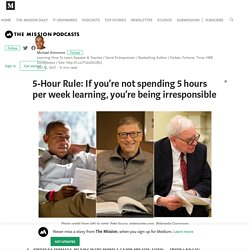
Zero.” — Charlie Munger, Self-made billionaire & Warren Buffett’s longtime business partner Why did the busiest person in the world, former president Barack Obama, read an hour a day while in office? Why has the best investor in history, Warren Buffett, invested 80% of his time in reading and thinking throughout his career? KRACK Attacks: Breaking WPA2. This is what slavery looks like today, in the eyes of slavers.
Bastyr University is trying to silence a blogger exposing naturopathy's false claims — Quartz. Elizabeth “Liz” Logelin was a young, fit woman with a promising career in operations management at Disney.
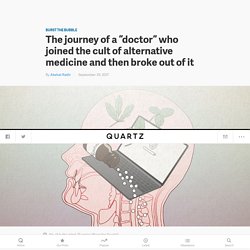
On March 24, 2008, after a complicated pregnancy that saw her bedridden for nearly two months (three weeks of which were in the hospital), she delivered her daughter Madeline (“Maddie”) through an emergency cesarean section. Two and a half months early, Maddie was healthy, if tiny. Lessons Learned Scaling Airbnb 100X – Jonathan Golden – Medium. On my first day at Airbnb, in early 2011, I walked in to see cofounder Joe Gebbia building my desk.
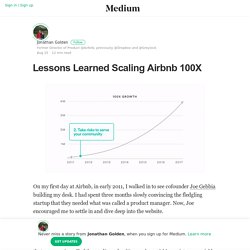
I had spent three months slowly convincing the fledgling startup that they needed what was called a product manager. Now, Joe encouraged me to settle in and dive deep into the website. As I scrolled through the listings I noticed something: Those faces in the reviews? Several were walking around the office. Manuel Lima: A visual history of human knowledge. Forget far-right populism – crypto-anarchists are the new masters. Those who mistakenly thought 2016 was an anomaly, a series of unprecedented events, should have few remaining doubts.

Marine Le Pen may have stuttered but still picked up almost 11 million votes. Her opponent, the “normal” candidate, was leader of a party only one year old. The ongoing terror attacks, fake news panic, Trump’s tweets and James Comey: last year never really ended, it just carried straight on into this one. After decades of exaggerated prediction, the internet is finally transforming politics, but not in the way the digital prophets expected. WorkingLearningLeading. Conservation of Information Made Simple. In the 1970s, Doubleday published a series of books with the title “Made Simple.” This series covered a variety of academic topics (Statistics Made Simple, Philosophy Made Simple, etc.). The 1980s saw the “For Dummies” series, which expanded the range of topics to include practical matters such as auto repair.
A ‘Digital Alchemist’ Unravels the Mysteries of Complexity. Sharon Glotzer has made a number of career-shifting discoveries, each one the kind “that completely changes the way you look at the world,” she said, “and causes you to say, ‘Wow, I need to follow this.’” A theoretical soft condensed matter physicist by training who now heads a thriving 33-person research group spanning three departments at the University of Michigan in Ann Arbor, Glotzer uses computer simulations to study emergence — the phenomenon whereby simple objects give rise to surprising collective behaviors. “When flocks of starlings make these incredible patterns in the sky that look like they’re not even real, the way they’re changing constantly — people have been seeing those patterns since people were on the planet,” she said. “But only recently have scientists started to ask the question, how do they do that? Unexpected Benefits of Digital Transformation.
Digital tools can be used in many different “right” — and surprising — ways to add value to an organization. Many different fields of study — such as psychology, human-computer interaction, and ecology — have employed the concept of “affordances.” The term refers to the different possible actions that someone can take with an object in a particular environment. For example, someone can interact with a beach ball by batting it in the air, letting it float in water, sitting on it, or popping it. The importance of affordances is the shift in focus from the characteristics of the object to what one can do with an object in a particular situation.
This is the most dangerous time for our planet. As a theoretical physicist based in Cambridge, I have lived my life in an extraordinarily privileged bubble. Cambridge is an unusual town, centred around one of the world’s great universities. Within that town, the scientific community that I became part of in my 20s is even more rarefied. And within that scientific community, the small group of international theoretical physicists with whom I have spent my working life might sometimes be tempted to regard themselves as the pinnacle. In addition to this, with the celebrity that has come with my books, and the isolation imposed by my illness, I feel as though my ivory tower is getting taller. Deepak Mehta's answer to What are the most productive ways to spend time on the Internet? - Quora. Defensibility creates the most value for founders. James Currier is a co-founder and partner of NFX Guild, an early-stage fund with a three-month program for marketplace and network businesses.
How to join the network The recent $26 billion LinkedIn acquisition by Microsoft was the largest in the history of the software industry, and the $19 billion WhatsApp acquisition by Facebook in 2014 was close behind. Quora. 131 Flynn and Ugyel Diagnostic Tool ANZAM 2013. The Stanford Encyclopedia of Philosophy has achieved what Wikipedia can only dream of — Quartz.
The Stanford Encyclopedia of Philosophy may be the most interesting website on the internet. The Human Brain Project. The design patterns of work — Work Futures. Bernard Stiegler: «L’accélération de l’innovation court-circuite tout ce qui contribue à l’élaboration de la civilisation» «Disruptif». Le terme, dixit le dictionnaire de l’Académie française, dérive du latin disrumpere, «briser en morceaux, faire éclater». Dans le langage des entreprises du numérique, «l’innovation disruptive», c’est l’innovation de rupture, celle qui bouscule les positions établies, court-circuite les règles du jeu, impose un changement de paradigme. De Google à Uber, la «disruption» bouleverse nos vies connectées. Mais à quel prix ? Directeur de l’Institut de recherche et d’innovation du centre Pompidou, fondateur de l’association Ars Industrialis, le philosophe Bernard Stiegler consacre son travail aux effets des mutations technologiques.
The Radical Plasticity Thesis: How the Brain Learns to be Conscious. The Ultimate Guide for Becoming an Idea Machine. Notre futur économique entre techno-miracle et techno-déprime. « Qu’est-ce qui a le plus changé le cours de l’histoire ? » interroge Andrew McAfee (@amcafee) sur la scène de USI. La religion ? A Tool to Map Your Next Digital Initiative. Intelligence artificielle : le transhumanisme est narcissique. Visons l'hyperhumanisme. Le transhumanisme est-il un humanisme ?
(Flickr-CC-cblue98) Récemment, des scientifiques et des dirigeants d’entreprises influents déclaraient publiquement que l'intelligence artificielle (IA) constituait l’une des pires menaces pour l’humanité. C’est en tous les cas le point de vue de l’astrophysicien Stephen Hawking, du fondateur de Microsoft, Bill Gates, ou encore d’Elon Musk, cofondateur de Tesla Motors et de SpaceX. Atteint de la maladie de Charcot (dystrophie neuromusculaire) Stephen Hawking, qui communique pourtant avec le monde extérieur grâce à un ordinateur synthétiseur de voix, actionné par le mouvement de ses yeux, explique que l’IA risque de conduire l’humanité à sa perte parce que les ordinateurs et les robots devenus plus intelligents que l’Homme finiront par le réduire à l’esclavage.
Même discours alarmiste du côté du fondateur de Microsoft, qui dénonce lui aussi le danger de domination de l’IA sur l’humanité. De nouvelles dimensions plutôt qu'une domination. Forum Changer d'ère #4 - Introduction par Joël de Rosnay. Algocracy: Opportunities and Risks (videocast with Adam Ford) – Algocracy and the Transhumanist Project.
BenklerWEB.